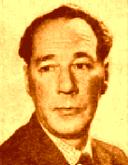John Wyndham
(1903-1969)
(John Wyndham Parkes Lucas Beynon Harris)

John Wyndham
(1903-1969)
(John Wyndham Parkes Lucas Beynon Harris)

John Wyndham's concern about time was not central but very early in his work. Wanderers of Time had been written originally under his own name John Beynon Harris in Wonder Stories (1933) and reprinted in Coronet Books, Hodder Paperbacks Ltd., London (1973)
"(Del said:) "... this must
be a kind of "dead" spot in time. It is as though our machines had been
thrown into the flow of time and swept along until, for some unguessable
reason, they met an obstruction at this point. Every one of us has arrived
here because his machine was faulty in some way or other. To take an illustration
- a bad one, I admit, but enough for our purpose - one may consider time
as a river. You may turn boats adrift on it at many points, and they will
all collect together at the same serious obstacle, whether they have travelled
a hundred miles or two miles. We are now at some period when the straight
flow of time has been checked - perhaps it is even turning back upon
itself. We know no details at present, but it is certain that the same
curious phenomenon has thrown us all together."
"But," Hale objected, "time,
like space, surely is curved?"
"It may be - in fact, it
must be; but I see no reason why there should not be interruptions in time.
After all, are not the stars interruptions in space?"
"You mean that space may
interrupt time in the same way that time distorts space?"
"Roughly, yes - if you can
consider the two apart, which I find impossible. I merely repeat that we
have struck some barrier and been thrown up like so much jetsam."
"Then there may be others,
besides ourselves?"
"As many others as made faulty
time-travellers.""
(John Wyndham: Wanderers of Time, 1933)
(John Wyndham: Wanderers of Time, 1933)
"Del shook his head gently:
"You don't realise. There are no towns."
"No towns?"
"Neither towns, nor men."
"You're foolin' me! They
can't all be dead."
"They must be, or the insects
would not be ruling."
"But - but do you mean the
ants have killed all the men?"
"It seems unlikely. Probably
men just stopped."
"I don't get you."
"Men did not kill off the
great reptiles who ruled the world before them - the reptiles just stopped.
It seems to me that man, too, has "had his little day and ceased to be."""
(John Wyndham: Wanderers of Time, 1933)
|
|
|
|
|
|
|